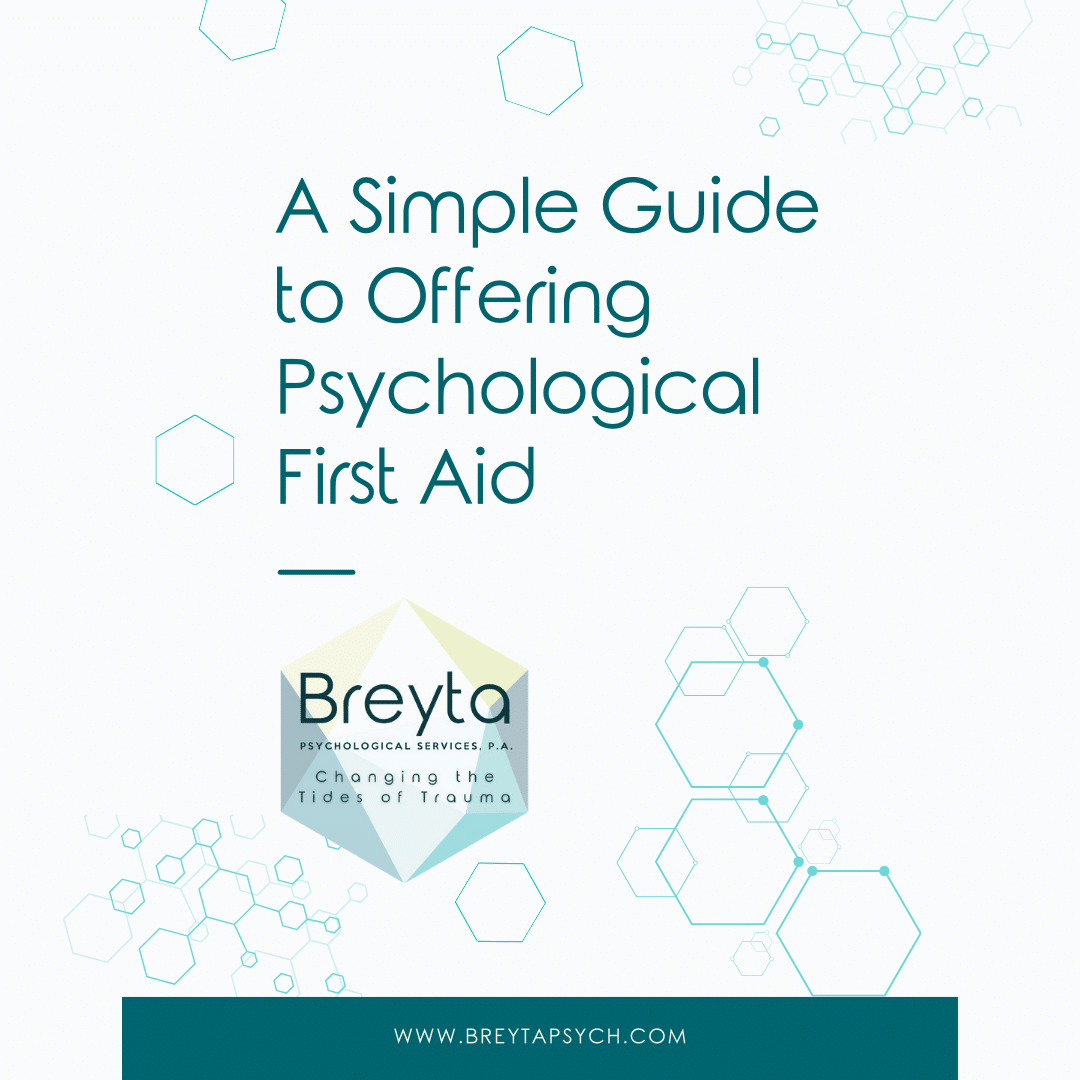by Vanessa H. Roddenberry, Ph.D., HSP-P
When disaster strikes, the ground beneath us shifts in ways we often don’t expect. But the internal world of those affected shifts too, leaving behind emotional wounds as real as any physical damage. At Breyta Psychological Services, we understand the invisible weight of trauma and aim to help carry it with those in need.
What is Psychological First Aid (PFA)?
In times of crisis, survival is the immediate concern. However, the emotional impact of a disaster lingers long after. Developed by the National Child Traumatic Stress Network and the National Center for PTSD, Psychological First Aid (PFA) provides a framework for offering both practical and emotional care. This approach doesn’t demand that survivors rise above their trauma. Instead, it honors them where they are, providing compassion and safety.
Breyta’s Specialization in Trauma Care
At Breyta, we treat traumatic stress and PTSD every day. Recovery isn’t just about rebuilding the physical, but about making room for emotional healing. Trauma can’t simply be pushed aside; it requires attention and care. PFA helps survivors feel seen, heard, and supported, creating a sense of safety amidst chaos.
History and Development of Psychological First Aid
PFA was created to meet the emotional and psychological needs that arise immediately after traumatic events. Previously, disaster responses focused on physical safety, often overlooking the emotional toll. The developers of PFA recognized that emotional wounds can be just as profound as physical ones, aiming to fill this critical gap.
Designed for mental health professionals, first responders, and volunteers, PFA offers a compassionate and structured approach to supporting individuals affected by trauma. Its goal is to reduce immediate distress, encourage adaptive coping, and promote long-term recovery.
Components of Psychological First Aid
PFA is based on eight core actions that target both emotional and practical needs:
- Contact and Engagement: Compassionate, non-intrusive contact ensures survivors feel supported.
- Safety and Comfort: Physical and emotional reassurance helps survivors regain a sense of control.
- Stabilization: Simple techniques help calm and orient emotionally overwhelmed individuals.
- Information Gathering: Assess immediate physical and emotional needs.
- Practical Assistance: Help with immediate concerns, such as contacting loved ones or securing shelter.
- Connection with Social Supports: Reconnect survivors with family, friends, or community resources.
- Coping Information: Provide strategies for handling stress reactions and encouraging resilience.
- Linkage with Services: Connect survivors with longer-term support, such as mental health care.
These actions ensure that survivors are supported holistically, addressing both practical needs and emotional responses to their trauma.
The Role of PFA in Disaster Recovery
PFA plays a crucial role in reducing the risk of long-term psychological harm. Early intervention can prevent the development of severe conditions, like Posttraumatic Stress Disorder (PTSD). SAMHSA reports that nearly 25% of individuals exposed to disasters may develop serious mental health issues, but PFA can act as a protective factor by providing early support.
PFA also emphasizes reconnection with social networks, whether through family, friends, or community resources. These relationships often serve as protective factors that support recovery and resilience. As psychologists specializing in trauma, we know how critical these connections are for healing.
Recognizing Trauma Responses
It’s normal to experience a range of emotional, cognitive, physical, and behavioral reactions after a disaster. Some common trauma responses include:
- Emotional: Fear, anger, sadness, or numbness.
- Cognitive: Trouble concentrating or racing thoughts.
- Physical: Fatigue, headaches, and muscle tension.
- Behavioral: Withdrawal from others or changes in sleep and appetite.
While these responses are natural, if they persist or worsen over time, professional help may be needed. If trauma symptoms endure for more than one month and begin to interfere with daily life, it may indicate the need for specialized trauma therapy.
When to Seek Professional Help
PFA provides critical early support, but some individuals may require more long-term care. Signs that it’s time to seek professional help include:
- Flashbacks or nightmares.
- Avoidance of reminders related to the trauma.
- Persistent anxiety or hypervigilance.
- Trouble returning to daily routines.
At Breyta Psychological Services, we specialize in evidence-based treatments for PTSD and traumatic stress, including Cognitive Processing Therapy (CPT) and Prolonged Exposure Therapy (PE). These therapies help survivors regain control and begin the journey toward healing.
Our Commitment to Trauma Recovery and Resilience
At Breyta, we understand that trauma impacts individuals, families, and communities. That’s why we take a holistic approach to healing, recognizing the importance of community support in fostering emotional resilience.
We’re also offering a free, downloadable guide to Psychological First Aid for anyone who wants to support others in times of crisis. This guide simplifies the PFA approach, making it easy to understand and apply in real-world situations. Whether you’re a first responder, community leader, or concerned friend, this guide provides the tools to offer compassionate care.
Download our free PFA guide here:
If you or a loved one needs help in the aftermath of a disaster, Breyta Psychological Services is here to support you. We offer specialized trauma therapy and PTSD treatment in Raleigh and throughout North Carolina. Whether you’re seeking support for yourself or looking for guidance in helping others, we encourage you to contact us for a consultation.
References
National Child Traumatic Stress Network, & National Center for PTSD. (2006). Psychological first aid: Field operations guide (2nd ed.). U.S. Department of Veterans Affairs. https://www.nctsn.org/resources/psychological-first-aid-pfa-field-operations-guide-2nd-edition
Substance Abuse and Mental Health Services Administration (SAMHSA). (2021). Disaster behavioral health: Overview. SAMHSA. https://www.samhsa.gov/find-help/disaster-distress-helpline





